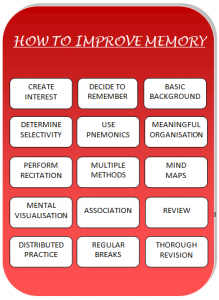 16 Super Methods to Improve Memory
16 Super Methods to Improve Memory
Every student must know the methods to improve memory. A student can score good marks in exams. It all depends on his previous knowledge, present efforts and attitude towards learning. If his previous knowledge is small, he must put in more efforts.
He must be anxious enough to learn well i.e. his attitude towards learning should be positive. Attitude towards learning ultimately depends on his general attitude towards life, what he wants to become. Whatever may be the level of learning, these memory methods and suggestions are surely going to be beneficial to all the students:
16 Super Methods to Improve Memory
1) Create Interest:
In order to remember something thoroughly, you must be interested in it. You must have a reason to learn it. If you are not interested, force it, as you need it. Avoid 'self-diversion'. Concentration is must.
2) Decide to remember:
You must be positive about wanting to remember what you are learning, and also positively knowing that you will remember well.
3) Basic Background:
Understanding of new materials depends to a great degree on how much you already know about the subject. So, try to increase your basic knowledge.
4) Selectivity:
You must determine what is most important and select those parts to study and learn.
5) Use mnemonics or acronyms:
Headings or points can be very well memorized by the use of mnemonics and acronyms.
6) Meaningful Organization:
You can learn and remember better if you can group ideas into some sort of meaningful categories or groups.
7) Recitation:
Saying ideas aloud in your own words is probably the most powerful tool to increase short-term as well as long-term memory.
8) Use multiple methods of memory:
You cannot rely on any one method of memory alone for all types of learning material. You must try alternative methods for memory retention for different subjects and topics.
9) Create mind maps:
Organise the study material in hand by breaking into parts and joining different parts by way of mind maps.
10) Mental Visualization:
Another powerful memory principle is taking a mental picture of what needs to be remembered.
11) Association:
Memory is increased when facts to be learnt are associated with something familiar. By recalling something you already know and making a link, you should be able to remember new information more efficiently.
12) Review:
By summarizing or reviewing you can consolidate the learning material.
13) Distributed Practice:
A series of shorter study sessions distributed over several days is preferable to fewer but longer study sessions.
14) Take regular breaks:
Take regular breaks between two sessions of memory.
15) Revise thoroughly:
Repetition is the mother of learning. Don't avoid revisions periodically.
16) Commitment:
Each time you study, clearly specify the topic or work you want to complete and set yourself a given period of time in which to complete it. Don't become a "clock watcher".
Don't forget:
a) To keep pen and paper with you before sitting for reading.
b) To make brief notes.
c) To draw diagrams.
d) To test yourself after learning.
Principles of Memory – For Super Memory
